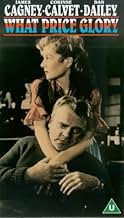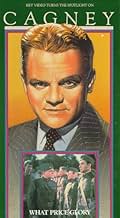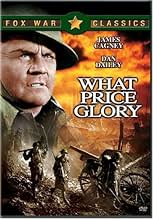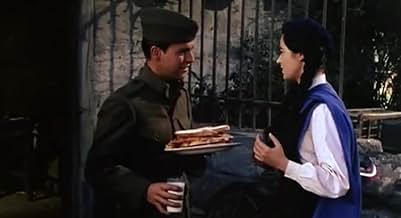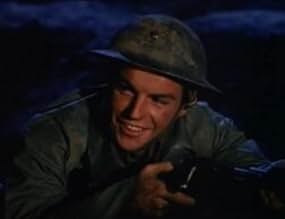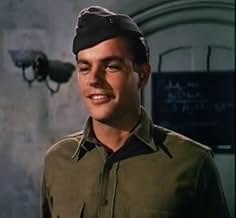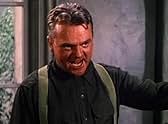IMDb RATING
6.1/10
1.5K
YOUR RATING
The wartime romantic misadventures of Captain Flagg, commander of a company of US Marines in 1918 France.The wartime romantic misadventures of Captain Flagg, commander of a company of US Marines in 1918 France.The wartime romantic misadventures of Captain Flagg, commander of a company of US Marines in 1918 France.
Max Showalter
- Lt. Moore
- (as Casey Adams)
Luis Alberni
- Grand Uncle
- (uncredited)
Olga Andre
- Sister Clothilde
- (uncredited)
Tina Blagoi
- Mrs. Bouchard
- (uncredited)
Danny Borzage
- Gilbert
- (uncredited)
George Bruggeman
- German Lieutenant
- (uncredited)
Frederic Brunn
- German Officer
- (uncredited)
Paul Bryar
- Charmaine's Uncle
- (uncredited)
Featured reviews
Ford might be best known for his Westerns, but he made nearly as many military pictures as he made Westerns (perhaps more if we were to count his cavalry pictures in the military genre). What Price Glory is a WWI picture starring James Cagney as a commanding officer. He's involved with the daughter of an innkeeper, Charmaine (Corinne Calvet), but he doesn't think he should marry her. He pushes off one of his underlings (Dan Dailey) on her, but later regrets it. There's also a nice romantic subplot involving a young Robert Wagner and a French teenager, Marisa Pavan. A lot of it works very well. I love Calvet. She's best known for her role in Anthony Mann's The Far Country, where she played the pig-tailed girl with the stocking cap who was always trying to sing for Jimmy Stewart. Oh, I know she's not a great actress, but she's so damn cute and charming. I love her character here, nice but opportunistic. The sets and cinematography are very good. The one aspect that really harms it is Dan Dailey. He gives a very weak performance and is very unsympathetic. 7/10.
This patriotic war film is the bees knees for slap stick, witty comedy. The mixture of wussy brown nosing privates and annoyed sarcastic generals provides a hilarious bitter sweet feeling that can put a smile on your face. Not to mention the constant friendly rivalry between the comedic loud mouthed Captain Flagg (Cagney being Cagney), and the irritated Sergeant Quirt played by Dailey, for the cute and innocent French waitress Charmaine. This movie not only made a great world war 1 film, but proved Cagney was still his energetic, pound for pound, hard nosed self even at 53 years old. The only downside to the movie was the poorly portrayed dramatic war speeches and the failed attempts at giving a life lesson. But all around 8/10
One of the great anti-war plays of the 1920s was Maxwell Anderson's What Price Glory. The play expressed popular American feeling that we were never going to war again like that and endure the slaughter in those trenches in France that occurred in the short time we were there. Remember we only declared war in 1917 and the thing had been going on in Europe for three years by the time we got there.
One of the things Woodrow Wilson as President and the American Expeditionary Force commander John Pershing insisted on was that the American army when fully trained would fight as a unit and not just be replacement troops for the French and British already there. They deviated only once from that policy when the American First Marine Division became the first American troops in battle in World War I at Belleau Wood. These Marines depicted here are part of those troops.
John Ford is one of our great American directors and when he does his own work on material never before used he's produced some remarkable cinema. But here he takes a serious anti-war play and turns it into one of his service comedies. There certainly are comedic elements in What Price Glory, but it's a serious picture.
The original silent film version done by Raoul Walsh was faithful to Maxwell Anderson's spirit and introduced those two Marines Edmund Lowe and Victor McLaglen who were so popular as Captain Flagg and Sergeant Quirt that they went and starred in a slew of buddy films. In fact they and James Cagney and Pat O'Brien introduced and popularized the buddy film genre.
Cagney steps into McLaglen shoes here and Dan Dailey plays Sergeant Quirt. They played two belligerent oafs in this and play them well, but no one ever thought of re-teaming them.
John Ford should have let this classic alone.
One of the things Woodrow Wilson as President and the American Expeditionary Force commander John Pershing insisted on was that the American army when fully trained would fight as a unit and not just be replacement troops for the French and British already there. They deviated only once from that policy when the American First Marine Division became the first American troops in battle in World War I at Belleau Wood. These Marines depicted here are part of those troops.
John Ford is one of our great American directors and when he does his own work on material never before used he's produced some remarkable cinema. But here he takes a serious anti-war play and turns it into one of his service comedies. There certainly are comedic elements in What Price Glory, but it's a serious picture.
The original silent film version done by Raoul Walsh was faithful to Maxwell Anderson's spirit and introduced those two Marines Edmund Lowe and Victor McLaglen who were so popular as Captain Flagg and Sergeant Quirt that they went and starred in a slew of buddy films. In fact they and James Cagney and Pat O'Brien introduced and popularized the buddy film genre.
Cagney steps into McLaglen shoes here and Dan Dailey plays Sergeant Quirt. They played two belligerent oafs in this and play them well, but no one ever thought of re-teaming them.
John Ford should have let this classic alone.
Marine buddies James Cagney (as Captain Flagg) and Dan Dailey (as Sergeant Quirt) carouse through World War I, and eventually become rivals for the affections of beautifully-proportioned Frenchwoman Corinne Calvet (as Charmaine). Newly arriving from Philadelphia, handsome 22-year-old Robert Wagner (as Private Lewisohn) is attracted to local 17-year-old Marisa Pavan (as Nicole Bouchard). The pretty, dark-haired girl's father is upset. Rivaling Mr. Wagner for handsomeness, Craig Hill (as Aldrich) asks the titular question, "What price glory?" Future TV stars William Demarest and Harry Morgan support the troops...
This successful stage comedy-drama became a huge "silent" film hit for Fox in 1926, winning Quigley Publications "Best Picture" award and rising high in everyone's "Ten Best" list for the year. This 1952 re-make did not score as well with audiences...
One of the original film's "all-talking" comedy sequels was the semi-musical "The Cock-Eyed World" (1929), which is how this project was initially envisioned. We have colorful cinematic sets, a few remaining musical performances and stage-lighting techniques. Director John Ford and the Fox personnel assembled were much more aware of the earlier films, helping to explain this misfire. The story began as an anti-war statement; while present, the point gets lost in the inebriated interplay between Mr. Cagney and Mr. Dailey. The actors are forced to alternate between broad "F Troop"-style antics and the accumulation of dead bodies.
***** What Price Glory (7/25/52) John Ford ~ James Cagney, Dan Dailey, Corinne Calvet, Robert Wagner
This successful stage comedy-drama became a huge "silent" film hit for Fox in 1926, winning Quigley Publications "Best Picture" award and rising high in everyone's "Ten Best" list for the year. This 1952 re-make did not score as well with audiences...
One of the original film's "all-talking" comedy sequels was the semi-musical "The Cock-Eyed World" (1929), which is how this project was initially envisioned. We have colorful cinematic sets, a few remaining musical performances and stage-lighting techniques. Director John Ford and the Fox personnel assembled were much more aware of the earlier films, helping to explain this misfire. The story began as an anti-war statement; while present, the point gets lost in the inebriated interplay between Mr. Cagney and Mr. Dailey. The actors are forced to alternate between broad "F Troop"-style antics and the accumulation of dead bodies.
***** What Price Glory (7/25/52) John Ford ~ James Cagney, Dan Dailey, Corinne Calvet, Robert Wagner
So much has been said in the reviews to date that none of it bears repeating, but there are a couple of points one should be aware of before investing 1hr 45min into this movie. Though filmed in 1952, the style has the feel of a movie from the late 30's/early 40's with the slapstick violence, goofy foreigners, and hammy acting. I expect and tolerate these things from pre-WWII flicks, but is hard to take from something produced in the 1950's.
As far as the anti-war element goes, this version is more of a tragic story of war than a pacifist piece. No pacifist here, but if you are looking for this from What Price Glory you'll be disappointed.
As far as the anti-war element goes, this version is more of a tragic story of war than a pacifist piece. No pacifist here, but if you are looking for this from What Price Glory you'll be disappointed.
Did you know
- TriviaJohn Ford was an uncredited second unit director in the 1926 version directed by Raoul Walsh.
- GoofsCaptain Flagg's command was referred to as L Company, 5th Marines. In WWI Marine Companies were numbered. Prior to WWI they served independently with battalions and above were ad hoc organizations. 5th Marines should 5th Regiment. The change from Regiment to Marines wouldn't come until the 30s.
- Quotes
Captain Flagg: It's a lousy war, kid... but it's the only one we've got.
- ConnectionsFeatured in Las Vegas, un couple (1970)
- SoundtracksOui, Oui, Marie
(uncredited)
Music by Fred Fisher
Lyrics by Al Bryan and Joseph McCarthy
Sung by Corinne Calvet and chorus
- How long is What Price Glory?Powered by Alexa
Details
- Release date
- Country of origin
- Languages
- Also known as
- Au service de la gloire
- Filming locations
- Marine Corps Base Camp Pendleton, California, USA(army base scenes)
- Production company
- See more company credits at IMDbPro
- Runtime1 hour 51 minutes
- Aspect ratio
- 1.37 : 1
Contribute to this page
Suggest an edit or add missing content



